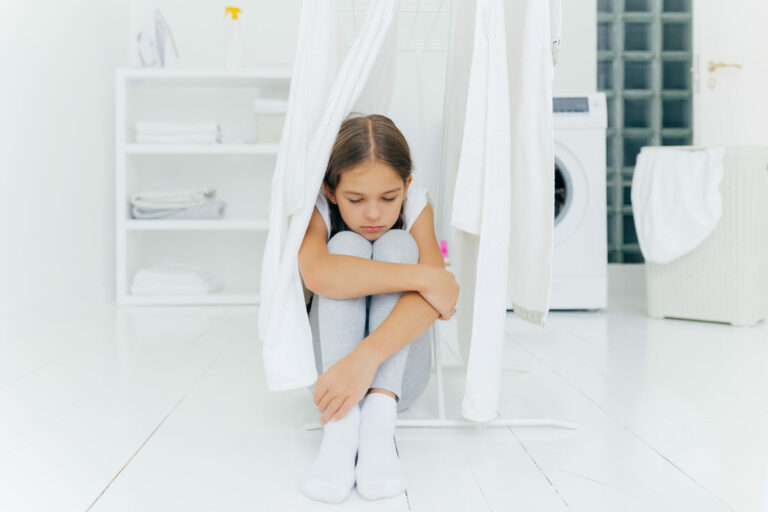Katie Loh is one of our clinical interns and is a family coach with Christian Family Care. In this Family Care Learning podcast episode, Katie speaks with Haley Morte, one of our Child and Family Therapists who is also a family coach, about ways for parents to relate to their children with trauma during the holidays. Haley has also grown her family through fostering and adoption.
Why do my child’s behaviors increase from October through February?
With the holiday season upon us, Haley says she always likes to tell parents she works with, whether it’s in the counseling or the family coaching environment, that our kids are just about two months into school, and for a lot of them who have experienced trauma, school is not the easiest thing for them. This can be due to moving from placement to placement and not having enough consistencies in their life and with school. There are a number of things that could have happened, even socially within the school, that are just difficult for some of our kiddos.
On top of this big transition for children, Haley says this time of year is also when parent-teacher conferences happen and midterm grades come out, so it can be a really difficult season for them.
“And then right after that, we go straight into the holidays,” she said.
“What we often see is that a lot of parents start reporting… that their kiddos seem to have an increase in challenging behaviors… and now they’re asking, ‘Why is this? Why is my kid starting to have more angry outbursts? Why is my kid starting to get bad reports from school?’ I think it’s just important that we help parents understand that this is something we see consistently with the kiddos that we work with,” she shared. It’s a pattern she says she notices in her therapy sessions–especially during the holidays.
Haley says she helps families by offering to help them do their detective work in order to help their child. Detective work can come in the form of asking questions and taking notice of certain behaviors.
“Is their body starting to remember and pick up on the fact that this time of year is rough for me… How do we help our kids navigate maybe the half of the year that they don’t like as much, and how do we offer grace to our kids?” she said. “How do we help name this for our kids? How do we support them in this season of yuckiness?” she added.
For a lot of people the holiday season is a really fun time of year, but for some of our children, it just isn’t.
What are some signs my child is grieving during the holiday season?
Two common things that we often see from our children is that they either have a hyper response or a hypo response.
With a hyper response, Haley says we start seeing an increase in challenging behaviors. This could come out as aggression toward certain people or items, or our children may destroy things in their angry outbursts.
With a hypo response, we could see our children isolate themselves a little bit. Maybe they seem a little bit more depressed, or maybe their appetite and their sleeping habits change and they just seem to be shutting down a little bit more.
As fall and Halloween decorations start going up, Haley says for some children with trauma this can be scary for them and even trigger them. It can cause kids to go back to a memory when they were younger that could trigger a trauma response. It could seem as if this response is coming out of nowhere when actually it comes from a prior experience.
We have to remember for those who have foster children or adoptive children, they are missing their biological family,” she said. “They’re longing to be with their family… We are going into this holiday season… with fun traditions…, but there’s still that longing and that missing for that biological family and the memories that they made with them,” she explained.
As parents, we need to be able to identify this and help our children as they navigate these circumstances. “It might be hard as a parent to go back and sit in that grief with our children, but it’s so important for them,” she said. That is a loss for them. “It’s another holiday season that they’re not going to be with that biological family and how can we acknowledge that? How can we embrace maybe some traditions that they had with their families and really honor that for them?” she said.
It can be hard for children to communicate how they’re feeling, and sometimes their needs come out as challenging behaviors. “We have to remind ourselves about that as parents… that they are just expressing a need.”
If we do see our children having a change in demeanor this season, we should identify what their needs are. Is it the grief? Is it the longing for their biological parents? Is it just the need for somebody to say, “Hey, I know there’s some really fun things about this season, but I also know it’s really hard. It is okay to be sad, and it’s okay to experience a wave of emotions.” Haley says communicating these words with your children can build a connection and be a huge blessing to them.
What are some signs my child is experiencing sensory overload?
Haley shared a story where one of her own children experienced a major meltdown after an evening going to look at Christmas lights. This experience for the child caused a sensory overload. “We could not get her to calm down for hours, and looking back, we had her in a car with a bunch of people… There was probably loud Christmas music playing, there are people walking outside of our car, there are bright Christmas lights, there are those giant inflatables everywhere, and she probably had a major sensory overload,” Haley shared.
What do we do if we have children that experience a sensory overload during the holidays? “I think it’s really important that we make their world smaller,” Haley said. “What I mean by that is… maybe we don’t require those kids to go to some of those activities,” she said. When things are overwhelming for them, we should consider doing something else as a family.
Some signs that a child is experiencing sensory overload are:
- Shutting down emotionally
- Covering their ears
- Wanting to avoid situations, people and/or places
- More sensitive to touch
- Seem uncomfortable in their body
“I do think a lot of times we get so caught up in wanting to make this a great experience for my child… they seem like they’re struggling, so let’s just add something more that would make this holiday season memorable for them. I think there’s good intention in that, but I think a lot of times we need to recognize that for a lot of our children, this is not helpful for them,” Haley said. “What I mean by that is that it might be overwhelming, or it might be making them feel like we are not… addressing the issue…”
Haley says some children might want you to acknowledge and accept where they’re at.
“I think for a lot of the children in our home that are feeling overwhelmed, it’s giving them some healthy control and helping them feel like they have some voice,” she said. “For some of our children that might even be going back and saying, ‘Let’s talk about when you were with your mom and dad and what were some things that you guys did during the Christmas season or the holiday season?’”
Haley explains to parents that it’s not natural to do the detective work. Some days it is a choice.
“Hear me say that it’s not easy, but I think it is rewarding when we are able to have these sweet moments with our child and just even see; I know as a parent, there have been times where I can just tell my child is struggling and we just talk about it, we identify it, and even just to see them take a deep breath… sometimes that’s rewarding as a parent to go and see that they feel heard,” Haley said.
How do I make the holiday season enjoyable for my child?
“I would always just say to lower the bar and to have grace,” she said.
Sometimes as parents we forget that our children do not always use their words all the time. It’s behaviors that often express their needs and emotions.
“My sister-in-law actually lost her grandfather last year and they were very close… He passed away right before the holidays and I remember at Christmas she brought chocolate covered cherries because that was something that she used to eat with him every year on Christmas and she said, ‘I’m bringing these because I want to honor him this Christmas…’ As adults with her, it was easy to say, ‘Yes, absolutely, let’s talk about him, let’s talk about your memories, let’s talk about your traditions, but that is an adult using their words, telling us I need this in this moment,” Haley said.
Children on the other hand, are not able to express their needs as well as adults can. Maybe as parents, we see that our child is starting to get dysregulated, and in these moments we need to remind ourselves that this is their way of using their words. This is a behavior that is their way of trying to communicate that there is something going on and they have a need.
“While it might be… difficult, know that… behaviors may be their only way to express to you that they’re struggling, so go and sit in that with them, have grace and a willingness to say, ‘I understand, buddy, I understand,’” Haley said.
Katie Loh is one of our clinical interns and is a family coach with Christian Family Care. In this Family Care Learning podcast episode, Katie speaks with Haley Morte, one of our Child and Family Therapists who is also a family coach, about ways for parents to relate to their children with trauma during the holidays. Haley has also grown her family through fostering and adoption.
Why do my child’s behaviors increase from October through February?
With the holiday season upon us, Haley says she always likes to tell parents she works with, whether it’s in the counseling or the family coaching environment, that our kids are just about two months into school, and for a lot of them who have experienced trauma, school is not the easiest thing for them. This can be due to moving from placement to placement and not having enough consistencies in their life and with school. There are a number of things that could have happened, even socially within the school, that are just difficult for some of our kiddos.
On top of this big transition for children, Haley says this time of year is also when parent-teacher conferences happen and midterm grades come out, so it can be a really difficult season for them.
“And then right after that, we go straight into the holidays,” she said.
“What we often see is that a lot of parents start reporting… that their kiddos seem to have an increase in challenging behaviors… and now they’re asking, ‘Why is this? Why is my kid starting to have more angry outbursts? Why is my kid starting to get bad reports from school?’ I think it’s just important that we help parents understand that this is something we see consistently with the kiddos that we work with,” she shared. It’s a pattern she says she notices in her therapy sessions–especially during the holidays.
Haley says she helps families by offering to help them do their detective work in order to help their child. Detective work can come in the form of asking questions and taking notice of certain behaviors.
“Is their body starting to remember and pick up on the fact that this time of year is rough for me… How do we help our kids navigate maybe the half of the year that they don’t like as much, and how do we offer grace to our kids?” she said. “How do we help name this for our kids? How do we support them in this season of yuckiness?” she added.
For a lot of people the holiday season is a really fun time of year, but for some of our children, it just isn’t.
What are some signs my child is grieving during the holiday season?
Two common things that we often see from our children is that they either have a hyper response or a hypo response.
With a hyper response, Haley says we start seeing an increase in challenging behaviors. This could come out as aggression toward certain people or items, or our children may destroy things in their angry outbursts.
With a hypo response, we could see our children isolate themselves a little bit. Maybe they seem a little bit more depressed, or maybe their appetite and their sleeping habits change and they just seem to be shutting down a little bit more.
As fall and Halloween decorations start going up, Haley says for some children with trauma this can be scary for them and even trigger them. It can cause kids to go back to a memory when they were younger that could trigger a trauma response. It could seem as if this response is coming out of nowhere when actually it comes from a prior experience.
We have to remember for those who have foster children or adoptive children, they are missing their biological family,” she said. “They’re longing to be with their family… We are going into this holiday season… with fun traditions…, but there’s still that longing and that missing for that biological family and the memories that they made with them,” she explained.
As parents, we need to be able to identify this and help our children as they navigate these circumstances. “It might be hard as a parent to go back and sit in that grief with our children, but it’s so important for them,” she said. That is a loss for them. “It’s another holiday season that they’re not going to be with that biological family and how can we acknowledge that? How can we embrace maybe some traditions that they had with their families and really honor that for them?” she said.
It can be hard for children to communicate how they’re feeling, and sometimes their needs come out as challenging behaviors. “We have to remind ourselves about that as parents… that they are just expressing a need.”
If we do see our children having a change in demeanor this season, we should identify what their needs are. Is it the grief? Is it the longing for their biological parents? Is it just the need for somebody to say, “Hey, I know there’s some really fun things about this season, but I also know it’s really hard. It is okay to be sad, and it’s okay to experience a wave of emotions.” Haley says communicating these words with your children can build a connection and be a huge blessing to them.
What are some signs my child is experiencing sensory overload?
Haley shared a story where one of her own children experienced a major meltdown after an evening going to look at Christmas lights. This experience for the child caused a sensory overload. “We could not get her to calm down for hours, and looking back, we had her in a car with a bunch of people… There was probably loud Christmas music playing, there are people walking outside of our car, there are bright Christmas lights, there are those giant inflatables everywhere, and she probably had a major sensory overload,” Haley shared.
What do we do if we have children that experience a sensory overload during the holidays? “I think it’s really important that we make their world smaller,” Haley said. “What I mean by that is… maybe we don’t require those kids to go to some of those activities,” she said. When things are overwhelming for them, we should consider doing something else as a family.
Some signs that a child is experiencing sensory overload are:
- Shutting down emotionally
- Covering their ears
- Wanting to avoid situations, people and/or places
- More sensitive to touch
- Seem uncomfortable in their body
“I do think a lot of times we get so caught up in wanting to make this a great experience for my child… they seem like they’re struggling, so let’s just add something more that would make this holiday season memorable for them. I think there’s good intention in that, but I think a lot of times we need to recognize that for a lot of our children, this is not helpful for them,” Haley said. “What I mean by that is that it might be overwhelming, or it might be making them feel like we are not… addressing the issue…”
Haley says some children might want you to acknowledge and accept where they’re at.
“I think for a lot of the children in our home that are feeling overwhelmed, it’s giving them some healthy control and helping them feel like they have some voice,” she said. “For some of our children that might even be going back and saying, ‘Let’s talk about when you were with your mom and dad and what were some things that you guys did during the Christmas season or the holiday season?’”
Haley explains to parents that it’s not natural to do the detective work. Some days it is a choice.
“Hear me say that it’s not easy, but I think it is rewarding when we are able to have these sweet moments with our child and just even see; I know as a parent, there have been times where I can just tell my child is struggling and we just talk about it, we identify it, and even just to see them take a deep breath… sometimes that’s rewarding as a parent to go and see that they feel heard,” Haley said.
How do I make the holiday season enjoyable for my child?
“I would always just say to lower the bar and to have grace,” she said.
Sometimes as parents we forget that our children do not always use their words all the time. It’s behaviors that often express their needs and emotions.
“My sister-in-law actually lost her grandfather last year and they were very close… He passed away right before the holidays and I remember at Christmas she brought chocolate covered cherries because that was something that she used to eat with him every year on Christmas and she said, ‘I’m bringing these because I want to honor him this Christmas…’ As adults with her, it was easy to say, ‘Yes, absolutely, let’s talk about him, let’s talk about your memories, let’s talk about your traditions, but that is an adult using their words, telling us I need this in this moment,” Haley said.
Children on the other hand, are not able to express their needs as well as adults can. Maybe as parents, we see that our child is starting to get dysregulated, and in these moments we need to remind ourselves that this is their way of using their words. This is a behavior that is their way of trying to communicate that there is something going on and they have a need.
“While it might be… difficult, know that… behaviors may be their only way to express to you that they’re struggling, so go and sit in that with them, have grace and a willingness to say, ‘I understand, buddy, I understand,’” Haley said.




